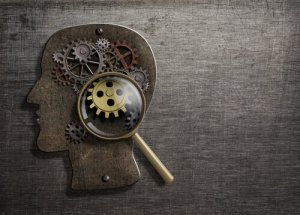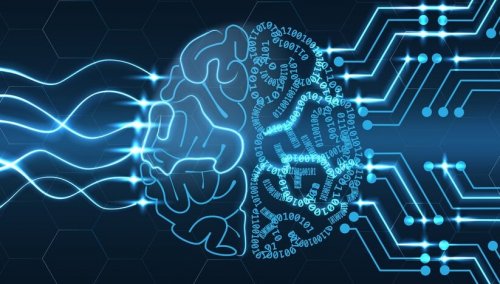Where's Our Freedom Against Mechanistic Determinism?

Faced with determinism, are we free when it comes to making a decision? Is our life already determined for us? These are questions that many thinkers and philosophers have asked themselves throughout history. Free will and its existence or absence has been a philosophical theme throughout history. Our subjective experience shows us that freedom of choice has a lot to do with strong mechanistic conditioning.
Determinism is based on the fact that all physical events are determined. In other words, everything stems from a chain of causes and effects. We can find many types of determinism: religious, economic, genetic, etc. In this article, we’re going to talk about mechanistic determinism.
Mechanistic determinism is based on the idea that human beings are similar to machines. Therefore, our brain is a tool capable of collecting a series of inputs, processing them, and transforming them into outputs. Free will alone is an illusion that stems from ignoring processes that take place between the input and output.
Throughout the article, we’ll explore two aspects to understand mechanistic determinism. First, we’ll talk about the principles and reasons that make us think about determinism. Second, we’ll talk about the homunculus paradox that applies to free will.
Reasons for thinking about mechanistic determinism
The idea of understanding the human mind as a machine was born from the computational metaphor of cognitive psychology. Cognitive psychology states that the brain is an information processor and is based on the idea that all human behavior can be explained through a series of algorithms and mental processes. For this reason, we began to compare the human brain to a Turing machine.

Although the computational metaphor is now obsolete because of the new connectionist models, it left a good reflection. The advancement of psychology allows us to explain more processes and unravel more of the psyche’s mysteries every day. We can now explain behaviors that we previously blamed on free will with a series of very defined processes.
This makes us seriously consider whether human behavior is merely the response to a chain of causes and effects or whether there really is an “I” inside us that decides. Imagine that we’re able to know all the variables that influence human behavior. Could we totally predict the behavior of any individual? The answer to this question seems to be “yes”. If that isn’t so, we would be denying the existence of free will, since we could determine the future.
In addition, neuroscience studies show us that our brain makes decisions long before we’re aware of them. These results make us consider the purpose of consciousness. Nowadays, it’s difficult to determine if our mind is deterministic or not. However, psychology draws from the premise that we can predict behavior with a certain level of error. Therefore, the idea of determinism is very useful for research.
The homunculus paradox in free will
As a final reflection on determinism, we want to talk about the homunculus paradox. This is a theoretical incompatibility of psychology with the existence of free will. On many occasions, a paradox can help us see our mistakes and use new cognitive frames or theoretical perspectives.
The homunculus paradox is based on the following: psychology tells us that all behavior or mental processes can be described and explained. Free will suggests that we have the freedom to choose what decisions to make. This would lead us to discover that there must be “something” that decides inside our brains. We’ll call this “something” a homunculus since it’s like a human inside us who decides.
Now, if the homunculus is what gives us the freedom to choose, what does free will give to it? We could say that within that homunculus there’s another homunculus that decides. But if we explain it that way, we fall into a paradoxical infinity of homunculi. We’d be comparing the human mind to matryoshka dolls.

Mechanistic determinism poses a useful paradigm for interpreting psychological reality. In addition, it seems that the evidence we’re finding, along with the theoretical incompatibles, take us in that direction. However, we shouldn’t trust ourselves. It’s more likely that the truth is much more complex and that it’s not found in any of the extremes (determinism and free will).
Faced with determinism, are we free when it comes to making a decision? Is our life already determined for us? These are questions that many thinkers and philosophers have asked themselves throughout history. Free will and its existence or absence has been a philosophical theme throughout history. Our subjective experience shows us that freedom of choice has a lot to do with strong mechanistic conditioning.
Determinism is based on the fact that all physical events are determined. In other words, everything stems from a chain of causes and effects. We can find many types of determinism: religious, economic, genetic, etc. In this article, we’re going to talk about mechanistic determinism.
Mechanistic determinism is based on the idea that human beings are similar to machines. Therefore, our brain is a tool capable of collecting a series of inputs, processing them, and transforming them into outputs. Free will alone is an illusion that stems from ignoring processes that take place between the input and output.
Throughout the article, we’ll explore two aspects to understand mechanistic determinism. First, we’ll talk about the principles and reasons that make us think about determinism. Second, we’ll talk about the homunculus paradox that applies to free will.
Reasons for thinking about mechanistic determinism
The idea of understanding the human mind as a machine was born from the computational metaphor of cognitive psychology. Cognitive psychology states that the brain is an information processor and is based on the idea that all human behavior can be explained through a series of algorithms and mental processes. For this reason, we began to compare the human brain to a Turing machine.

Although the computational metaphor is now obsolete because of the new connectionist models, it left a good reflection. The advancement of psychology allows us to explain more processes and unravel more of the psyche’s mysteries every day. We can now explain behaviors that we previously blamed on free will with a series of very defined processes.
This makes us seriously consider whether human behavior is merely the response to a chain of causes and effects or whether there really is an “I” inside us that decides. Imagine that we’re able to know all the variables that influence human behavior. Could we totally predict the behavior of any individual? The answer to this question seems to be “yes”. If that isn’t so, we would be denying the existence of free will, since we could determine the future.
In addition, neuroscience studies show us that our brain makes decisions long before we’re aware of them. These results make us consider the purpose of consciousness. Nowadays, it’s difficult to determine if our mind is deterministic or not. However, psychology draws from the premise that we can predict behavior with a certain level of error. Therefore, the idea of determinism is very useful for research.
The homunculus paradox in free will
As a final reflection on determinism, we want to talk about the homunculus paradox. This is a theoretical incompatibility of psychology with the existence of free will. On many occasions, a paradox can help us see our mistakes and use new cognitive frames or theoretical perspectives.
The homunculus paradox is based on the following: psychology tells us that all behavior or mental processes can be described and explained. Free will suggests that we have the freedom to choose what decisions to make. This would lead us to discover that there must be “something” that decides inside our brains. We’ll call this “something” a homunculus since it’s like a human inside us who decides.
Now, if the homunculus is what gives us the freedom to choose, what does free will give to it? We could say that within that homunculus there’s another homunculus that decides. But if we explain it that way, we fall into a paradoxical infinity of homunculi. We’d be comparing the human mind to matryoshka dolls.

Mechanistic determinism poses a useful paradigm for interpreting psychological reality. In addition, it seems that the evidence we’re finding, along with the theoretical incompatibles, take us in that direction. However, we shouldn’t trust ourselves. It’s more likely that the truth is much more complex and that it’s not found in any of the extremes (determinism and free will).
This text is provided for informational purposes only and does not replace consultation with a professional. If in doubt, consult your specialist.







